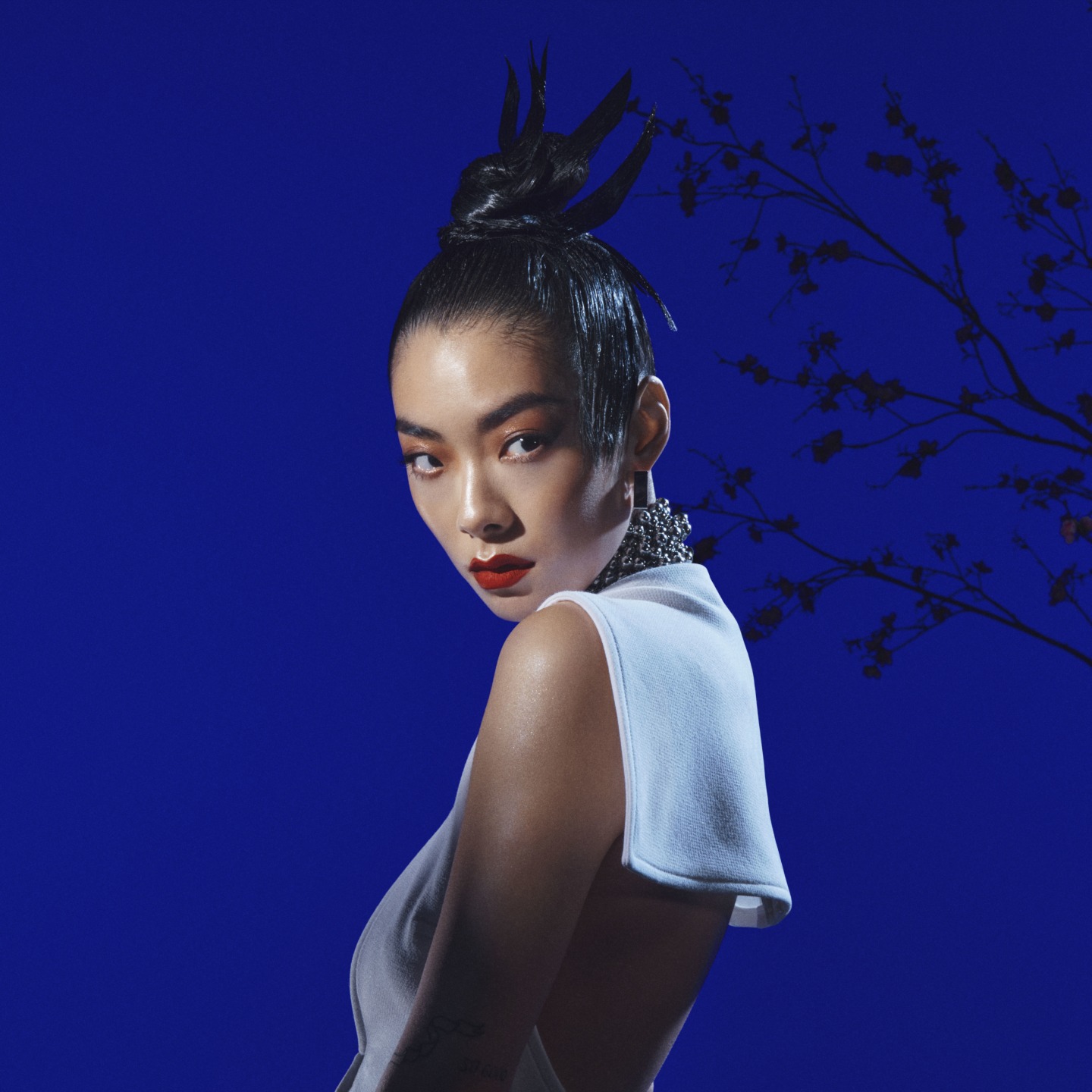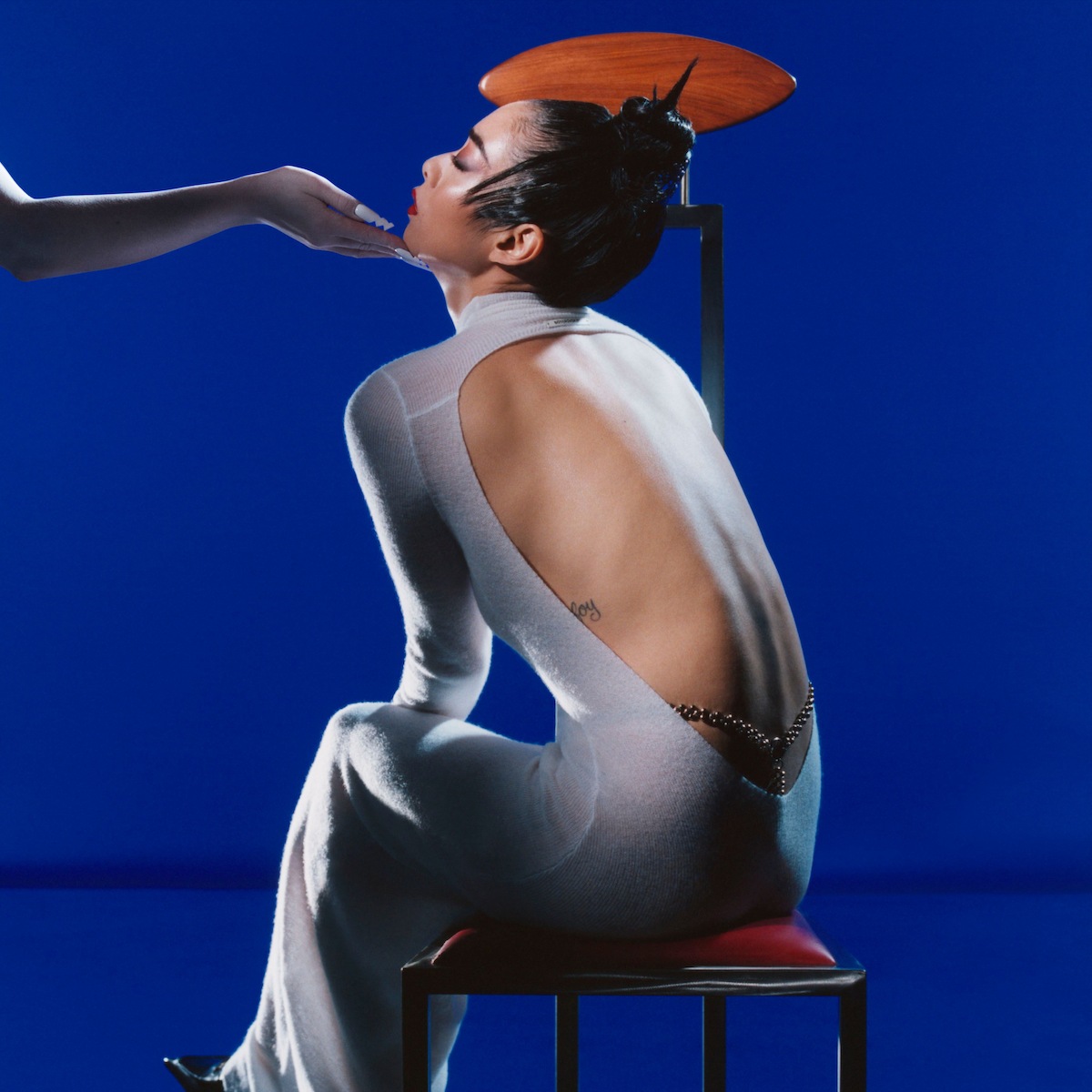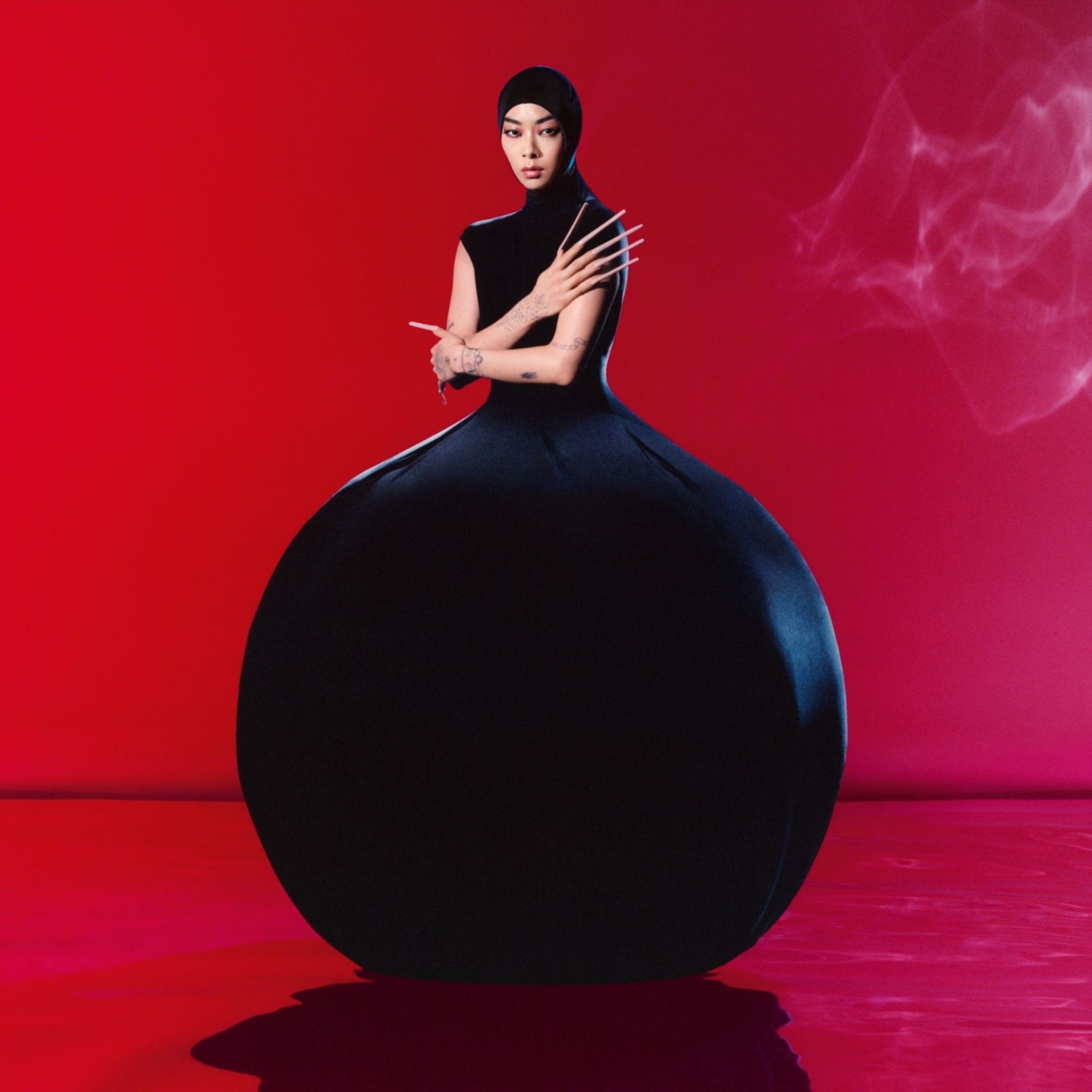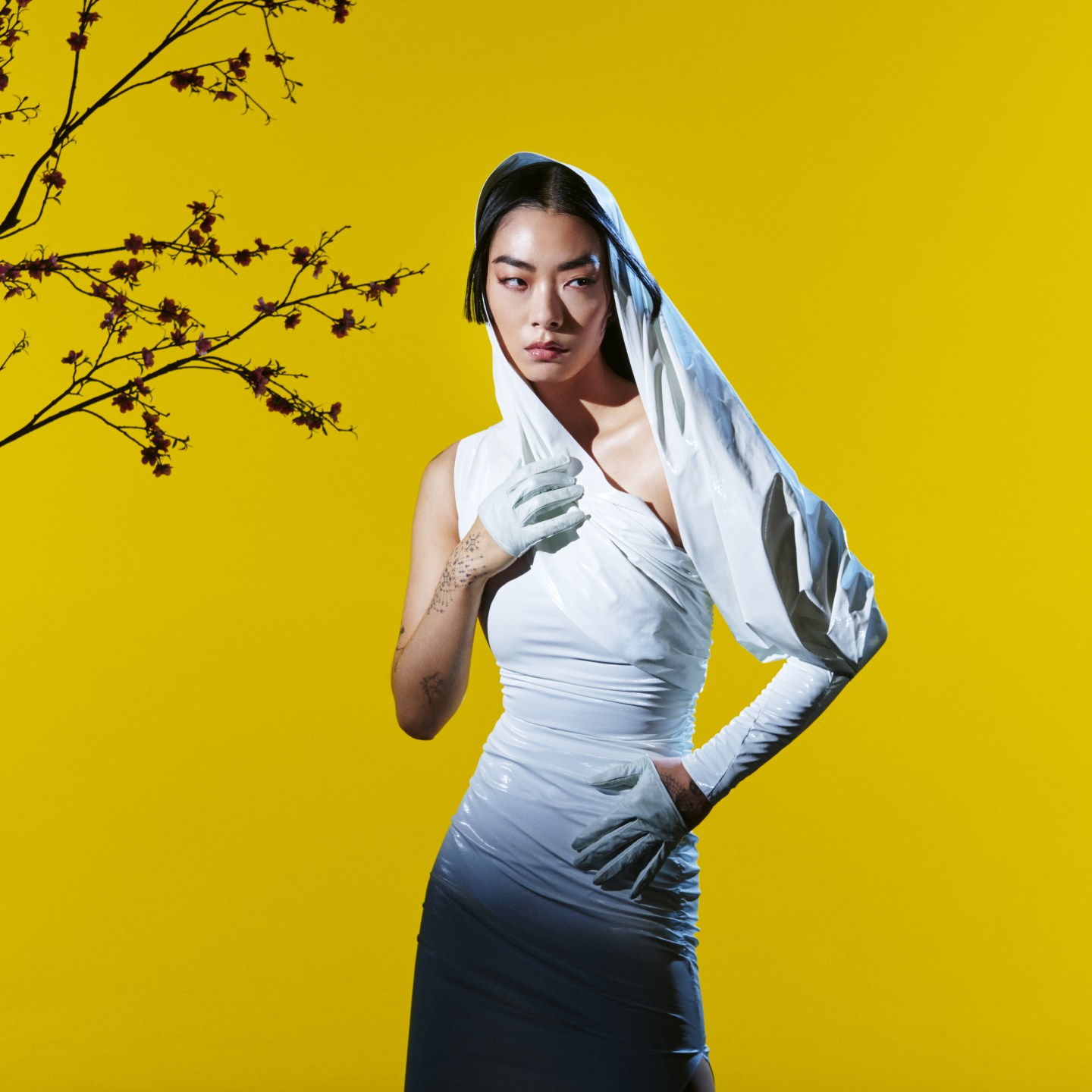 Thurstan Redding
Thurstan Redding
When Rina Sawayama released her self-titled debut album in 2020, the world was adapting to lockdown and an uncertain future. What could have been a disaster for the London-based pop star in waiting, however, became something of a blessing in disguise. The album’s high-octane blend of TRL-era pop and equally nostalgic nu-metal riffs created a soundtrack for DIY discos across the world as songs like “XS” and “Comme De Garcons” became staples for pop fans seeking a brief embrace of joy. The record also showcased Sawayama’s songwriting prowess, with “STFU!” sticking two fingers up at microaggressions the Japanese-born star had encountered while dating and “Chosen Family” becoming a favorite among membrers of her queer community (including Sir Elton John, who worked with her on a remix).
Fast forward two-and-a-half years: Sawayama is preparing to release her second album, Hold The Girl, boasting the confidence of a star who knows her musical risk-taking works as she returns to unlikely genres and artists for inspiration — one track imagines Irish group The Corrs writing for Gwen Stefani.
Elsewhere, however, she’s less assured. Much of Hold The Girl was written after extensive therapy, in which Sawayama learned to “re-parent” herself after a difficult upbringing that involved her sharing a bedroom with her mother until the age of 15. There’s a vulnerability in her new material that adds depth to her millennial nostalgia pop and acknowledges the nuances in life that are never easy to navigate.
I spoke to Sawayama last week about mixing humor with trauma in her lyrics, how to avoid pandering to an audience in the social media age, and the low-key influence of musical theater on her work.
 “Hold The Girl” single art.
Thurstan Redding
“Hold The Girl” single art.
Thurstan Redding
This Q&A is taken from the latest episode of The FADER Interview. To hear this week’s show in full, and to access the podcast’s archive, click here.
The FADER: You approach songwriting as you might a dissertation from your days at Cambridge. What were you reading around the time of making this album?
Rina Sawayama: During lockdown, I was really struggling mental health wise, even though my career was going really well. I was reading a lot of self-help books to try to gain perspective. I read Power of Now, which is a really famous book, and I was really skeptical at first, but it really helped. It got me back on track with mindfulness. I read Crying in H Mart, Michelle Zauner’s book. I really connected to that. I read other intense stuff, like Consent by Vanessa Springora, which is amazing. I like to read books by femmes about identity or their history — a mix of that and self-help.
I hear you read through Big Magic by Elizabeth Gilbert to help overcome writer’s block. What did you learn through her writing that helped you?
I think it was to do with fear — fear of failure and making mistakes. I was really scared of doing a bad second album. I felt like that was my destiny, and I couldn’t start. I was stuck, so uninspired. I listened to it as an audiobook while jogging, even though I hate jogging and I’ll never do it again. But it was really good.
Once you put financial responsibility on your art… You’re trying not to consider it, but it definitely becomes a factor in your decision making. The first album was quite unexpected, in terms of how many people it connected with, so I felt the pressure [this time around].
SAWAYAMA was unique in its release. It came out as lockdown started and had a whole lifespan within the height of the pandemic. Did you take confidence from the fact that the album gave people strength through that period?
Sometimes, yes. Other times, I knew I didn’t want to do that album again or write the same sort of songs. I’d moved on from the topic. But trying to innovate and make a new thing when people love something you’ve done in the past is scary.
Weirdly, not being able to tour and not being able to meet real fans and hear real feedback in real life helped in a way. I think I would’ve felt even more pressure if I’d met real fans, but I didn’t meet any real fans, really, for two years.
The major difference between a first album and a second album is that you have an audience and you know what they want from you. How do you strike that balance between keeping fans happy and not pandering to the first thing they want?
It’s about knowing what kind of artist you want to be. There’s an approach where it’s a lot to do with sticking to the formula, trying to make as much money [as possible]. Another route is “I don’t care if this goes well; at least I’m being true to myself” — the capitalistic approach and the self-enjoyment approach. For me, it was more important that I write a record I felt happy with, because that’s what the first record was all about. As soon as I tried to take in other people’s opinions, I was scared the whole thing would crumble.
When something’s big online, it can feel quite ephemeral and unreal, like, “I’ve seen this meme a hundred times, but someone across the street has never heard of it.” Did it feel like that — the very transient thing the internet gives us?
Totally. I didn’t know how big it really was. I couldn’t quantify what a retweet meant: Is that one fan? Is that two fans? I didn’t know. Things were happening so quickly that I couldn’t even process a lot of them. I still haven’t processed a lot of things, like the Brits rule change, Elton John, the Lady Gaga remix, Metallica. I wasn’t equipped to understand. I don’t think a lot of people are. It’s not a normal, human thing for your existence to be known by so many people. It was quite a shock when I came out of lockdown and was able to tour, but I felt so much happier doing things in real life and meeting real people. It became way more tangible and therefore more pleasurable.
Has this past year of live shows solidified where you feel you sit and how much you feel you’ve achieved?
Yeah, I love it. I just did a show in Tokyo. It was my first show in Japan and I played Summer Sonic, which was a 2020 listing. I’ve been waiting years to do that one. It was insane — 10,000, 15,000 people. I’d never properly promoted my record in Japan because I couldn’t, so that was crazy. The live part of it is what I crave and what motivates me to keep writing music. I’m amazed I managed to motivate myself to write a [second] record even though I hadn’t toured the first one. But now that I’m able to do live shows, I can test my music and know what I want to perform.
Have you found that any tracks from the first album have taken on lives of their own when you’ve played them live and become bigger than you’d anticipated?
“Lucid” was quite surprising, how many people loved that one in the set. “Paradisin’” is one of the ones people go crazy for. Also “Dynasty.” Album tracks that weren’t singles surprised me in [that way]. The tours I’ve had, they’ve been two years in the making. The people there have been holding onto their tickets for two years, and they’re so excited, so the energy is incredible.
 Hold The Girl album cover.
Thurstan Redding
Hold The Girl album cover.
Thurstan Redding
Hold The Girl opens with “Minor Feelings”, which is titled after a book by the poet Cathy Park Hong and about the marginalization of Asian-American experience. What did you wanted to say with that song?
I was so inspired by the title itself, because a lot of racial microaggressions are minor feelings, things you don’t feel you should speak up about because it’s not a hate crime or something you think about telling the police. But the reality is, especially with Asian people, that actually did turn into a lot of hate crimes during COVID. It was horrific what was happening to elderly Asian people around the U.S. and U.K. The rhetoric around Asians and COVID was terrible.
So much of what I’ve gone through can’t be separated from the sociopolitical background I exist in, which is that I’m an Asian queer woman. You can’t isolate my experience from that fact. There’s a line in there: ”Hide behind a plastic shield.” I read this article about an Asian nurse who was treating someone with COVID, but the patient refused to be treated by her because she’s Asian. That inspired that lyric, but also the simple description of minor feelings — this is not a major incident, but the things I was carrying from my past [made] it boil over, so, “Minor feelings are majorly getting me down.”
”This Hell” is a very good example of the way you put comedy into your music. There’s a line in that song — “God hates us / All right then” — that makes me laugh every time. How important is mixing humor in alongside traumatic lyrical themes?
So important. Humor is the last thing that you need to exist with your trauma throughout your life. It’s important to make light of horrible things that have happened to you and have a safe space to do that. The song is, at its core, very queer, but it was written in a time where that statement — “This hell is better with you” — applied to people around the world. COVID felt like hell, and you depended on the people around you for emotional support. I have an amazing group of queer friends that I consider my safe space. We make jokes about our trauma — terrible things that happened but that we can make light of. That’s really helpful to moving forward.
“Catch Me in the Air” is about your relationship with your mother. Not to delve into that too much, but I was curious if you played it for your mum and how that played out for you.
Yeah. I wrote that song in celebration of how far we’ve come, but also mixing in a bit of reality from my side and how it felt. The reality is we did share a bedroom until I was 15; we were struggling financially. With songwriting, it’s important to understand that even though I might have moved on from that and have good memories now because we’ve come so far, it’s not necessarily like that for everyone. My mum’s perspective might not be my perspective on things, even if it was a long time ago.
I think she’s very proud of the album and the music I write, but memories involve a lot of people’s versions of the truth. Overall, she’s really into the record. I actually haven’t sent her the link yet, but she’s heard bits and bobs. I did play it to her in person, but I get really awkward when she asks me details about lyrics. I get awkward when anyone is like, “So what does this lyric mean?,” but especially if it’s parents. I turn into a teenager— “GO AWAY!”
There’s a song on the album towards the end of the album called “Send My Love to John” that, in my mind, feels twinned with “Chosen Family” from the first album, which has always felt to me like it could be in a musical. Does musical theater have any importance in your life?
Oh, thank you! I think Hold the Girl is very musical theater. I was obsessed with Chicago growing up. “ Send My Love to John” is definitely a counterpoint to “Chosen Family,” because it’s for anyone who needs to hear “sorry” from their parents and will never get it. Specifically, I’m talking about a friend who was never accepted by their parents for their queerness, and there was one amazing thing the mom said at the end of a phonemail: ”Okay, send my love to John.” They’ll never hear the word “sorry:” “Sorry for ostracizing you.” “Sorry for making you feel this way.” “Sorry for being homophobic.” But that, to me, was the “sorry.” It was a tiny sliver, and sometimes that’s all we get. We can’t hang onto that, but sometimes we have to be okay with it.
[The track] comes from a very empathetic viewpoint of a parent, because I really think — having had a lot of people around me become parents during lockdown — that they go into this filled with love. They want the best for their child, but things happen: People are busy. [They have] financial stresses. They’re tired, and they can’t make the right decisions to support the child, and they’re scared for them when they’re a bit different. It’s a really special song for me because the whole record has themes of re-parenting — parenting yourself, parenting other people. I hope it makes people who need to hear that “sorry” from their loved ones feel a little bit more cared for.
Do you feel you’re writing more on this album from outside your own perspective? You’re clearly considering the way your mother and other parents have felt, getting out of your own head.
I’ve tried to — although, really, the whole record is so much through my perspective. I’d love to go from a more generic perspective next time, because the psychological giving when you write a record that’s so personal is quite a lot. I was really inspired by how Taylor Swift was able to write outside of her perspective for Folklore. It was something I hadn’t thought about as much until lockdown, when I was like, “Oh God, how am I gonna get inspiration? Nothing’s happening to me!” But actually, if you look around, there are so many stories waiting to be told.
 “Catch Me In The Air” single art.
Thurstan Redding
“Catch Me In The Air” single art.
Thurstan Redding
There’s a lane of artists — yourself, Charli XCX, Self Esteem — who feel as much students of pop as products of the genre. Is that something you recognize, and do you feel like a capital-P Pop star?
No, I feel like a fraud always [laughs]. I’m very lucky I have an incredible team of makeup and hair artists and stylists and photographers, but really I’m bewildered by everything. I entered this industry a bit later [than some], so there are so many things my brain can’t understand. But I feel so fortunate to exist in a time where there are people like me and Charli and Self Esteem — or even Little Simz, for example — who are able to tell these incredible stories and combine so many musical elements, and it’s not weird anymore. Also, we all have so much agency over our music and the way we’re perceived — our image, our marketing, everything. I’m constantly inspired by those people, and I hope people know that in the background, we all really support each other.
Does becoming an Ariana Grande-level star appeal to you?
I’m definitely not ready for it. I’m still catching up on things that happened two years ago. My little brain can’t handle it. My motivation is I wanna write big songs. That was the focus of this record: to house what was great about SAWAYAMA — which, to me, was that I was able to infuse it with such personal stories — in a much more refined pop songwriting structure, in a way that people might sing along to it at festivals and not know what it means, but then there’ll be a flip side meaning that people don’t know. I love that side of things, but I’m also obsessed with making the live performance side better and better. So if I’m able to do those two things, that’s great. I realize a big part of my job is to look hot, but that genuinely does not motivate me whatsoever. I feel very lucky that I get to work with my amazing visual team and my glam team — I literally don’t know what I’d do without them — but my big motivation is the skill of songwriting, becoming a better and better artist, connecting with as many people as possible, and seeing where that takes me.